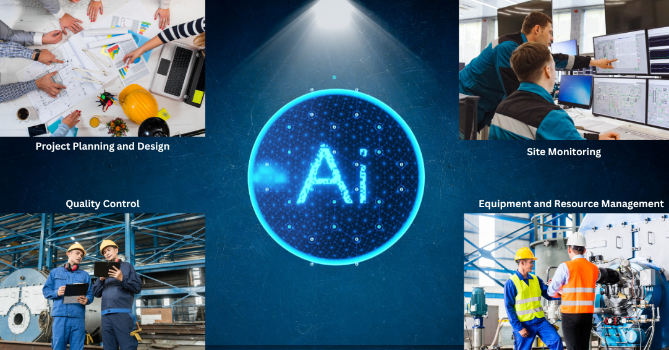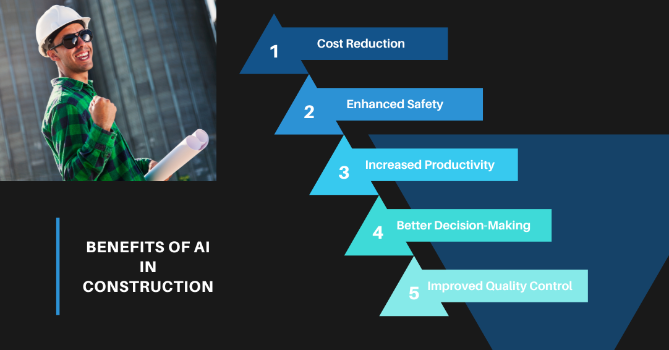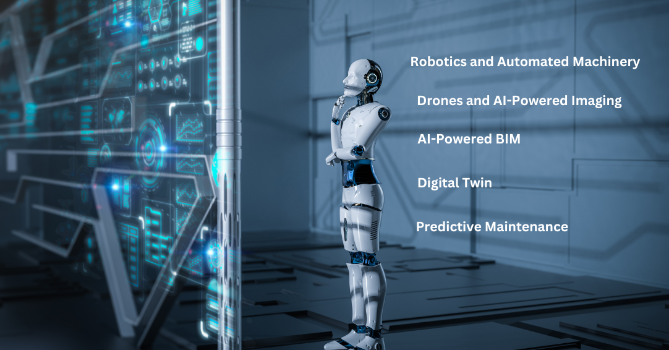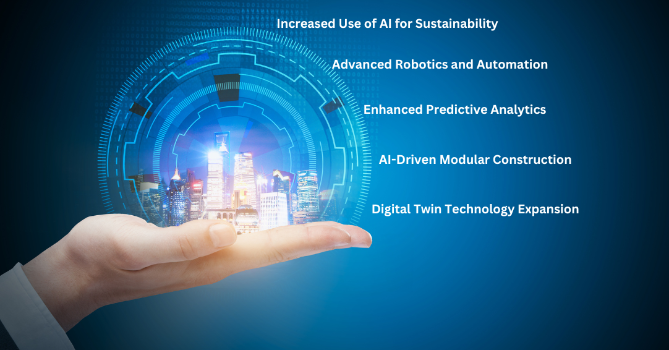.png)
Artificial Intelligence is Paving the Way for Smart Construction
Introduction
Artificial Intelligence (AI) is changing the construction industry. It is making construction smarter, safer, and more efficient. From planning to execution, AI tools help manage projects better.
Smart construction means using advanced technologies to improve how buildings are designed and built. AI plays a key role in this. It helps in predicting problems, reducing costs, and improving safety.
Many construction companies are now adopting AI to stay ahead. A recent study shows that AI could save the industry billions of dollars each year. This makes AI a game-changer in construction.
As we explore further, we'll see how AI is paving the way for smart construction.
The Role of AI in Smart Construction
AI is transforming every stage of the construction process. It is making tasks easier, faster, and more accurate. AI technologies, like machine learning and predictive analytics, help in various ways.

1. Project Planning and Design: AI tools analyze data to improve project planning. They help create better designs by predicting possible issues before they happen. For example, AI can analyze site conditions and suggest changes to avoid costly mistakes.
2. Site Monitoring: AI-powered cameras and drones monitor construction sites in real-time. They detect safety risks and ensure that work follows the plan. This reduces accidents and keeps the project on schedule.
3. Quality Control: AI helps maintain high standards of quality. By analyzing images and data, AI can identify defects or issues in construction. This ensures problems are fixed early, saving time and money.
4. Equipment and Resource Management: AI optimizes the use of machinery and materials. It predicts when equipment will need maintenance, reducing downtime. It also helps manage inventory, ensuring materials are available when needed.
Real-world examples show how AI is already improving outcomes. For instance, companies like Skanska and Autodesk use AI to boost efficiency and reduce waste. As more firms adopt these technologies, the role of AI in construction will only grow.
Benefits of AI in Construction
AI brings many benefits to the construction industry. It helps companies save money, improve safety, and increase productivity.

1. Cost Reduction: AI helps cut costs by reducing errors and improving planning. Predictive analytics can forecast potential problems and suggest solutions early on. This prevents costly mistakes and keeps projects within budget.
2. Enhanced Safety: AI improves safety on construction sites. AI-powered cameras and drones monitor sites to detect hazards. They can alert workers and managers about unsafe conditions, reducing accidents and injuries.
3. Increased Productivity: AI tools automate repetitive tasks, freeing up workers to focus on more important activities. This speeds up the construction process and improves efficiency. For example, AI can manage schedules and track progress, ensuring that projects stay on track.
4. Better Decision-Making: AI provides valuable insights by analyzing large amounts of data. It helps construction managers make informed decisions quickly. This data-driven approach reduces risks and improves the quality of work.
5. Improved Quality Control: AI systems can detect defects early in the construction process. By catching errors before they become major issues, AI ensures a higher quality of construction and fewer delays.
By embracing AI, construction companies can enhance their operations and stay competitive. The benefits of AI in construction are clear, making it a vital tool for the industry's future.
AI Technologies Driving Automation in Construction
AI technologies are driving automation in construction, making projects faster and more efficient. These technologies are changing how work is done on-site and off-site.

1. Robotics and Automated Machinery: Robots are increasingly being used in construction for tasks like bricklaying, concrete pouring, and welding. These machines work faster than humans and can operate 24/7. This speeds up the construction process and reduces labor costs.
2. Drones and AI-Powered Imaging: Drones equipped with AI-powered cameras provide real-time data about construction sites. They can capture detailed images and videos, helping to monitor progress and detect any issues early. This technology also helps in surveying land and mapping out areas accurately, which is essential for planning and safety.
3. AI-Powered BIM (Building Information Modeling): AI enhances BIM by making it more dynamic and responsive. It analyzes data from the design and construction phases to predict potential clashes or issues. This helps in optimizing designs and improving collaboration among project teams, reducing errors and rework.
4. Digital Twins: A digital twin is a virtual model of a construction project that uses AI to simulate real-world conditions. This technology allows teams to test different scenarios and make adjustments before construction begins. It helps in planning better and avoiding costly changes later.
5. Predictive Maintenance: AI predicts when equipment will need maintenance, preventing unexpected breakdowns. It analyzes data from sensors on machinery to foresee wear and tear, ensuring equipment stays in good working order. This reduces downtime and keeps projects on schedule.
These AI technologies are driving a new era of automation in construction. By reducing manual work, minimizing errors, and improving planning, AI helps make construction smarter and more efficient.
Challenges and Considerations
While AI offers many benefits in construction, it also comes with challenges. Companies need to consider these challenges when adopting AI technologies.

1. High Initial Costs: Implementing AI in construction requires a significant investment. The cost of AI software, hardware, and training can be high. Small to medium-sized companies may find it difficult to afford these upfront costs.
2. Data Security and Privacy: AI systems rely on large amounts of data. Protecting this data from cyber threats is crucial. Construction companies must ensure that their AI systems are secure and that sensitive information is protected.
3. Workforce Training and Adaptation: Introducing AI requires training workers to use new technologies. This can be time-consuming and costly. Some workers may also resist the change, fearing job losses due to automation.
4. Integration with Existing Systems: AI needs to integrate smoothly with existing construction technologies. If not done properly, it can disrupt workflows and lead to delays. Companies must plan carefully to ensure a smooth integration process.
5. Ethical and Regulatory Concerns: AI in construction must comply with regulations and ethical standards. Issues like privacy, data use, and the impact on jobs need careful consideration. Companies must ensure that their AI practices are ethical and compliant with laws.
Despite these challenges, the benefits of AI in construction outweigh the drawbacks. With careful planning and investment, companies can overcome these hurdles and harness AI's full potential.
Future Trends in AI and Smart Construction
AI is set to play an even bigger role in the future of construction. Several trends show how AI will continue to transform the industry.

1. Increased Use of AI for Sustainability: AI will help construction companies become more sustainable. It can optimize resource use, reduce waste, and lower energy consumption. AI can also help in designing greener buildings by analyzing environmental impacts during the planning phase.
2. Advanced Robotics and Automation: The use of robots in construction is expected to grow. Future robots will be more advanced and capable of handling complex tasks. This will lead to further automation, reducing the need for manual labor and increasing safety on job sites.
3. Enhanced Predictive Analytics: AI will improve predictive analytics in construction. Advanced algorithms will better forecast project timelines, costs, and risks. This will allow for more accurate planning and reduce unexpected delays and budget overruns.
4. AI-Driven Modular Construction: AI will boost modular construction, where buildings are made in sections and assembled on-site. AI can optimize the design and manufacturing process, making modular construction faster and more cost-effective.
5. Digital Twin Technology Expansion: Digital twins will become more sophisticated, offering real-time insights into construction projects. These virtual models will help teams test different scenarios and make adjustments quickly, improving decision-making and reducing errors.
As AI technologies evolve, their impact on smart construction will continue to grow. Staying ahead of these trends will be key for companies looking to remain competitive in the future.
Conclusion
AI is revolutionizing the construction industry, making it smarter, safer, and more efficient. From improving project planning and site monitoring to enhancing quality control and reducing costs, AI offers significant benefits. While there are challenges, such as high initial costs and data security concerns, the potential advantages far outweigh these obstacles.
The future of construction is closely tied to advancements in AI. As technologies like robotics, predictive analytics, and digital twins continue to evolve, they will further transform how buildings are designed, constructed, and maintained. Embracing AI is not just an option—it’s a necessity for companies that want to stay competitive and lead the way in smart construction.
By understanding and leveraging these AI-driven innovations, the construction industry can build a more sustainable and efficient future.